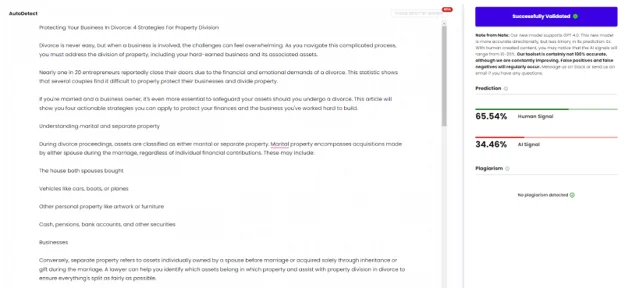Protecting Your Business In Divorce: 4 Strategies For Property Division
Divorce is never easy, but when a business is involved, the challenges can feel overwhelming. As you navigate this complicated process, you must address the division of property, including your hard-earned business and its associated assets.
Nearly 1 in 20 entrepreneurs reportedly closes their doors due to the financial and emotional demands of a divorce. This statistic shows that several couples find it difficult to properly protect their businesses and divide property.
If you’re married and a business owner, it’s even more essential to safeguard your assets should you undergo a divorce. This article will show you four actionable strategies you can apply to protect your finances and the business you’ve worked hard to build.
Understanding marital and separate property
During divorce proceedings, assets are classified as either marital or separate property. Marital property encompasses acquisitions made by either spouse during the marriage, regardless of individual financial contributions. These may include:
- The house both spouses bought
- Vehicles like cars, boats, or planes
- Other personal property like artwork or furniture
- Cash, pensions, bank accounts, and other securities
- Businesses
Conversely, separate property refers to assets individually owned by a spouse before marriage or acquired solely through inheritance or gift during the marriage. A lawyer can help you identify which assets belong in which property and assist with property division in divorce to ensure everything’s split as fairly as possible.
Classifying business ownership hinges on several factors. One would be the timing of the business acquisition. The source of funds used to establish and maintain the business is also considered. If marital assets contributed to the business, it may be deemed marital property. Lastly, a spouse’s involvement and contributions to the business can impact its classification.
For instance, if your business was founded before your marriage using separate funds and maintained without significant contributions from your spouse, it may qualify as separate property. Otherwise, a business launched during your marriage with joint efforts and marital funds could be classified as marital property.
Strategies for protecting your business
Safeguarding your business begins before you get married. Yet it’s possible to take precautionary steps to protect your assets even after marriage. Here’s what you can do:
- Pre-marital planning
Prenuptial agreements, agreed upon by 15% of couples in 2022, serve as a helpful tool in divorce proceedings. It can define separate property ownership, including business interests, before marriage. By clearly outlining the terms of asset division, a prenup can protect your business from potential claims during a divorce. Elements to include are the identification of pre-existing business assets and provisions for future business acquisitions.
Getting postnuptial agreements is an alternative if you’re unable to sign a prenup. Married couples may sign them when transferring ownership of a business. However, they have limitations compared to prenuptial agreements and may face greater legal scrutiny during divorce proceedings.
All in all, this is a great tool to speed certain financial and ownership decisions when circumstances change after marriage. Southwest Virginia couples looking to get a fast divorce in Roanoke understand the value of clear agreements that support fast divorce in Roanoke while limiting disputes over assets and responsibilities. Having defined terms in place can reduce uncertainty and help couples move through legal processes with fewer complications.
- Business entity structure
Apart from prenuptial planning, the business structure you choose—be it a sole proprietorship, limited liability company (LLC), or corporation—can significantly impact ownership and liability in the event of a divorce. Opting for an LLC or corporation, for instance, may provide greater protection by separating personal and business assets, potentially limiting your spouse’s claim on the business itself.
- Buy-sell agreements
Buy-sell agreements detail the process for handling business shares if triggering events, such as the death of a spouse or a divorce, occur. According to a study, only 15% of business owners make succession plans. Those without one usually face difficulties in handing over control to trusted individuals, risking the state of the business and its clients.
The agreements can stipulate terms for buyouts, business valuation methods, and payment structures, providing a clear roadmap for ownership transitions. The contracts can vary, but all aim to manage ownership changes smoothly. When drafting one, make sure you have legal advice on board so that it suits you and your business’s needs.
- Clear financial records
Separating personal and business finances is crucial for accurately categorizing assets during property division. Implementing sound bookkeeping practices and maintaining detailed financial records can substantiate the separate nature of business assets and protect against commingling with marital property.
Seeking professional guidance
Research shows that less than 50% of assets go to wives and far less to those without higher education. Consulting a qualified attorney specializing in business and family law is essential for developing a strategy to protect your assets during divorce. These legal professionals can provide personalized advice and guidance tailored to your circumstances. Additionally, financial advisors can also guide business valuation and post-divorce financial planning.
Conclusion
Protecting a business during divorce requires proactive measures and a strategic plan. Take the first step by consulting with legal and financial experts specializing in divorce and business matters. Their expertise can empower you to safeguard your assets wisely and confidently.












